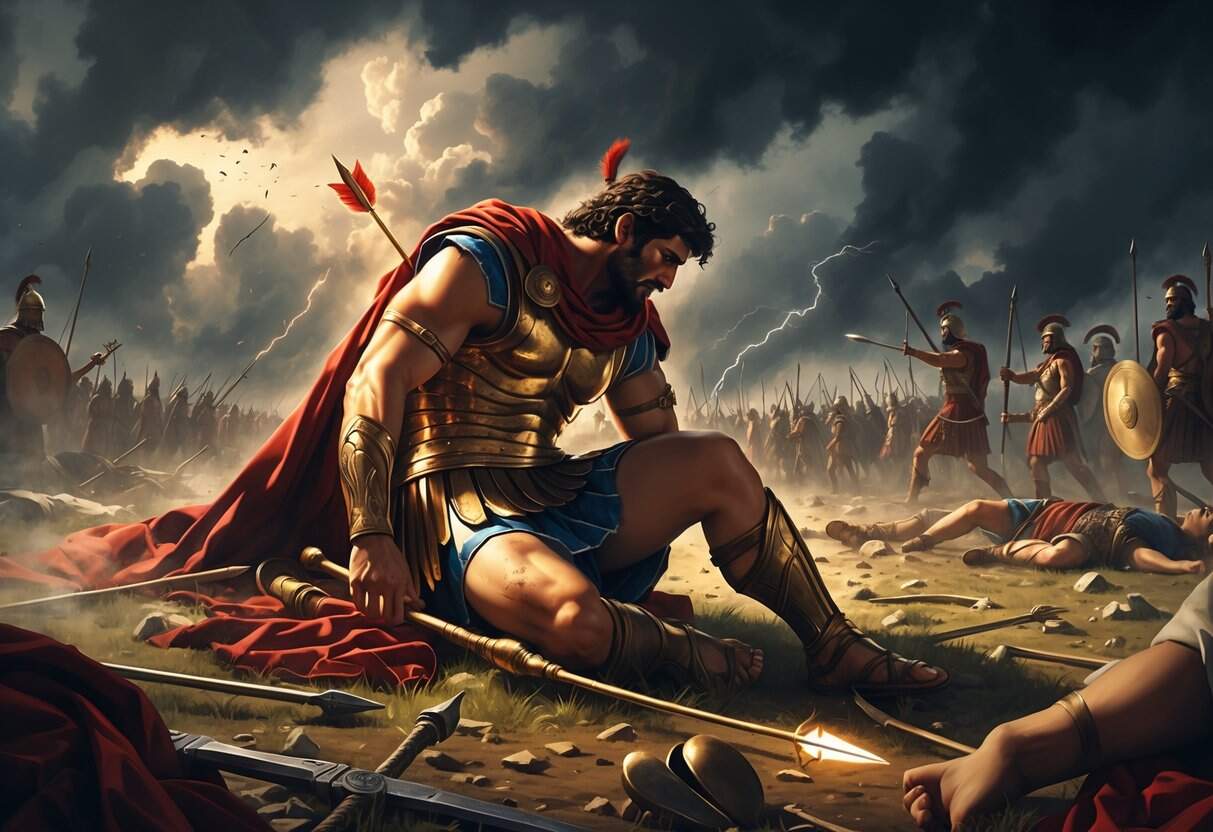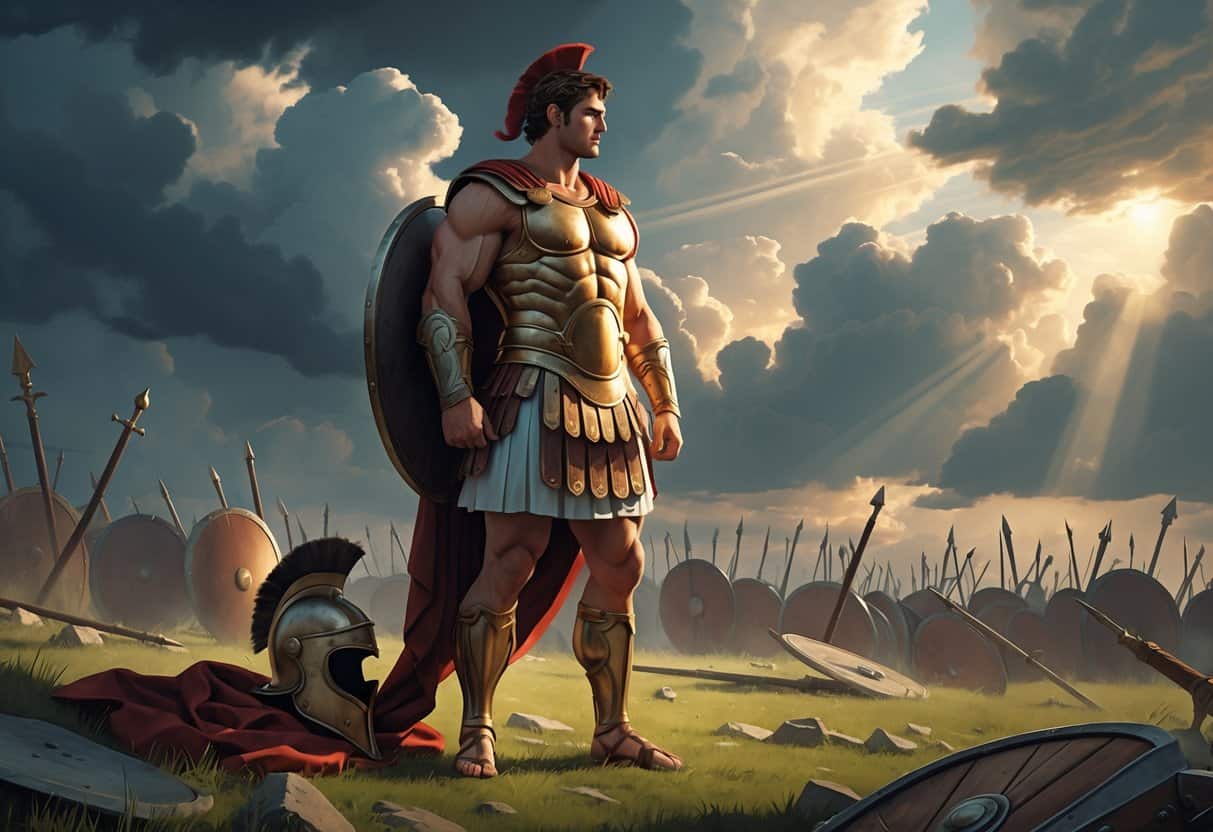Achilles stands out as one of the most legendary Greek heroes, celebrated for his strength and daring in the Trojan War. Despite his near invincibility, he had a single weak spot—his heel—that would seal his fate.

The story goes that Paris, with a little help from Apollo, shot an arrow that struck Achilles right in this vulnerable spot. It’s a moment that’s stuck with people for centuries, probably because it says something about all of us—nobody’s truly invincible.
This guide digs into Achilles’ life, his part in the Trojan War, and how his legend keeps echoing in literature and culture. Even now, his story kind of refuses to fade away.
Key Takeaways
- Achilles was a mighty Greek hero with one fatal flaw—his heel.
- He died when an arrow struck this vulnerable spot during the Trojan War.
- His tale explores the weird mix of strength and fragility in heroes.
Achilles’ Role and Character in Greek Mythology

Let’s look at where Achilles came from and what shaped him into such a big deal in Greek myth. His story is tangled up with gods, mortals, and everything in between.
Origins and Heritage
Achilles was the son of Peleus, king of the Myrmidons, and Thetis, a sea goddess. That made him a demigod, sort of half-human, half-divine.
Thetis wanted to make him immortal, so she dipped him in the River Styx, holding him by the heel. That one spot stayed vulnerable.
Achilles grew up in Phthia, a region in Greece. His family gave him power and status, but also a sense of being caught between two worlds.
Upbringing and Education
He was raised by the centaur Chiron on Mount Pelion. Chiron was famous for teaching heroes how to fight, heal, and think for themselves.
Chiron’s lessons made Achilles more than just a fighter. He learned about strategy, medicine, and maybe even a little wisdom. That’s probably why people respected him, not just feared him.
Character Traits and Heroic Status
Achilles was known for being strong, brave, and fiercely loyal. During the Trojan War, he was the Greeks’ top warrior.
But he was also quick to anger and proud, which sometimes got him into trouble. He’s a hero, sure, but also stubborn and deeply human.
The Trojan War and Achilles’ Fate
The Trojan War is packed with drama—heroes, betrayals, and battles that feel larger than life. Achilles’ anger and grief shape the story, right up to the moment his own weakness is revealed.
Key Roles in the Trojan War
The war was between the Greeks (the Achaeans) and the Trojans, led by King Priam. Warriors like Hector and Menelaus take the spotlight.
Achilles leads the Myrmidons, his loyal fighters. Paris, Hector’s brother, kicks off the whole mess by taking Helen. The war becomes a tangled fight for honor and revenge.
Wrath of Achilles
Achilles’ rage explodes when Agamemnon takes Briseis, his war prize. Achilles quits the battle, and the Greeks start losing ground.
His anger is about pride, but also about respect. Without him, the Greeks struggle. It’s a turning point in the Iliad—personal anger ripples out to affect everyone.
Death of Patroclus and Achilles’ Return
Patroclus, Achilles’ closest friend, puts on Achilles’ armor and heads into battle. Hector kills Patroclus, and Achilles is gutted.
This loss drags Achilles back into the fight, burning for revenge. You can almost feel how personal grief can change the course of a war.
The Wounding of Achilles’ Heel
Even with all his power, Achilles had that one weak spot. Paris, guided by Apollo, shoots an arrow that finds its mark—his heel.
That’s it. The prophecy comes true, and Achilles falls. For all his strength, he couldn’t outrun fate.
Literary Interpretations and Legacy
Achilles’ legend has been retold in countless ways. His story digs deep into themes like fate, pride, and the meddling of the gods.
The Iliad and Homeric Portrayal
In The Iliad, Homer paints Achilles as the Greeks’ greatest warrior. His anger at Agamemnon over Briseis leads him to sit out the fight, which nearly dooms the Greeks.
The gods are never far away—Apollo and Athena keep stirring the pot. Achilles refuses bribes and gifts, driven by vengeance. Homer doesn’t actually describe his death, which leaves it hanging as a kind of tragic shadow.
Other Classical and Modern Retellings
Later writers like Ovid in Metamorphoses and modern authors in books like The Song of Achilles put their own spin on the story. Ovid blames Apollo’s anger for Achilles’ end, while newer stories focus on his relationships—especially with Patroclus.
People have explored his childhood, his connections to other heroes, and his dreams. Each retelling tweaks the meaning, but the mix of heroism and vulnerability always sticks around.
Symbolism of the Achilles’ Heel
The phrase Achilles’ heel stands for a crucial weakness, even in someone who seems almost invincible.
In the old myth, Achilles’ mother Thetis dipped him in the River Styx to protect him, but his heel stayed untouched and vulnerable.
That tiny detail? It’s a reminder that everyone has limits, no matter how strong they look.
Artists and writers, from the ancient Greeks to modern times, love this metaphor. It’s a way to show how even a small flaw can topple greatness.
It also ties into bigger Greek myth themes, like Nemesis and the tricky idea of justice from the gods.
You might spot echoes of this in other stories—think of Prometheus’s endless punishment or the wild challenges Heracles faced. Sometimes it seems like destiny just won’t let people escape their weak spots.